A Deep Dive into the Strengths and Limitations of Open Source E-Commerce Platforms
Choosing between the variety of open-source e-commerce platforms can be overwhelming. With so many options, how do you find the right one?
In this article, we'll examine the open-source e-commerce platforms available and compare the top 10 options. We'll then provide a clear picture of each platform's strengths and limitations.
We hope you'll feel more confident picking the perfect platform for your business by the end!
Benefits of Open-Source E-Commerce Platforms
Ownership and Control
At Pantheon, we believe that ownership and control are essential for e-commerce businesses. Your online store is the heart of your business, and not having complete control over it is a big risk.
Open-source e-commerce platforms allow you to completely own your store and data and make decisions that align with your business goals. Unlike proprietary platforms, open-source solutions don't lock you into a vendor's ecosystem, and you can adapt and evolve your store as needed without constraints. This level of control ensures that your e-commerce platform can grow and change with your business, providing a stable foundation for long-term success.
Cost-Effectiveness
Open-source platforms often have significantly lower initial costs because they don’t charge licensing fees, allowing businesses to allocate their budgets more effectively. The availability of free themes and plugins can also cut down costs substantially!
Even for more significant sites that require a custom build, open source tends to be more cost-effective. With a large pool of developers familiar with these platforms, there is more competition for projects and flexible pricing. This means you can find skilled developers at reasonable rates and get the best value for your investment!
Flexibility and Customization
Whether you want to modify the code to add unique features or integrate with other systems, open-source solutions let you create a genuinely unique e-commerce store.
For example, a business can customize the checkout process to align with its branding or integrate its store with an existing inventory management system to streamline operations. Platforms like WooCommerce and Drupal Commerce have extensive plugins and extension libraries, which makes adding new features easier than having to start from scratch.
This flexibility means your e-commerce platform can adapt to your business's evolving requirements – pretty great, right?
Community Support
One strength of open-source e-commerce platforms is their strong developers and active user community. Countless forums, tutorials and documentation are available to help troubleshoot, providing a wealth of knowledge at your fingertips. It's comforting to know that this community means you always have support while dealing with the challenges of running an online store.
These global experts constantly work to enhance the platforms, fix bugs and introduce new features. This collaborative environment means open-source e-commerce remains up-to-date and reliable, giving you an innovative and well-supported platform.
Scalability
As your business grows, these platforms can handle increasing product catalogs and higher traffic volumes without compromising performance.
For instance, platforms like Magento Open Source and WooCommerce are built to manage extensive inventories and can scale to support thousands of products and numerous transactions simultaneously. This way, your e-commerce site stays efficient, providing a great shopping experience for your customers even during peak traffic. With the flexibility to scale up as needed, open-source solutions offer a reliable foundation for your business's long-term growth and success!
Common Misconceptions About Open-Source Platforms
When it comes to open-source e-commerce platforms, some myths need busting!
Myth #1: You Need to Know Coding Languages to Set Up a Shop
A common misconception about open-source e-commerce platforms is that you must know coding languages to set them up. But many of these platforms are user-friendly, giving you intuitive interfaces and extensive documentation to guide you through the setup process.
Take WordPress, for example. Known for its user-friendly nature, WordPress powers WooCommerce, the most popular e-commerce platform. Its intuitive setup and vast library of plugins make it accessible even for those without technical expertise.
You can get started with open-source plugins without having to write a line of code, but if you are really looking to create a unique and memorable commerce experience, tailoring the design and flow of your site will require some custom coding. Consider hiring a digital agency with expertise in e-commerce and enjoy the best of both worlds: ease of use and the powerful advantages of open source!
Myth #2: Open Source Is Less Secure
You can significantly boost your store's defenses by implementing best practices and using a hosting provider that offers enhanced security measures because their popularity makes them prime targets for cyberattacks. While it's true that popular platforms can attract more attention from malicious actors, this does not mean they are inherently less secure.
The nature of these platforms can instead enhance security. The large community of developers constantly reviews and improves the code, quickly identifying and addressing vulnerabilities. You can significantly boost your store's defenses by implementing best practices and using a hosting provider that offers enhanced security measures.
Pantheon provides sturdy security features that protect your open-source e-commerce platform against threats. From automated backups and updates to advanced threat detection and mitigation, Pantheon helps maintain a secure environment for your online store. With the proper practices and support, open-source platforms can be just as safe – if not more so – than closed-source.
Myth #3: Open Source Doesn’t Have Any Support
It’s true that open-source platforms typically don’t come with a dedicated support team. However, this doesn’t mean you’re on your own. Open source communities are pervasive, passionate and helpful and you'll find plenty of forums, documentation and tutorials to guide you. Plus, you can always choose a host that provides excellent support, like Pantheon’s 24/7 support, ensuring you have professional assistance when needed!
Top 10 Open Source E-Commerce Platforms
WooCommerce
Image
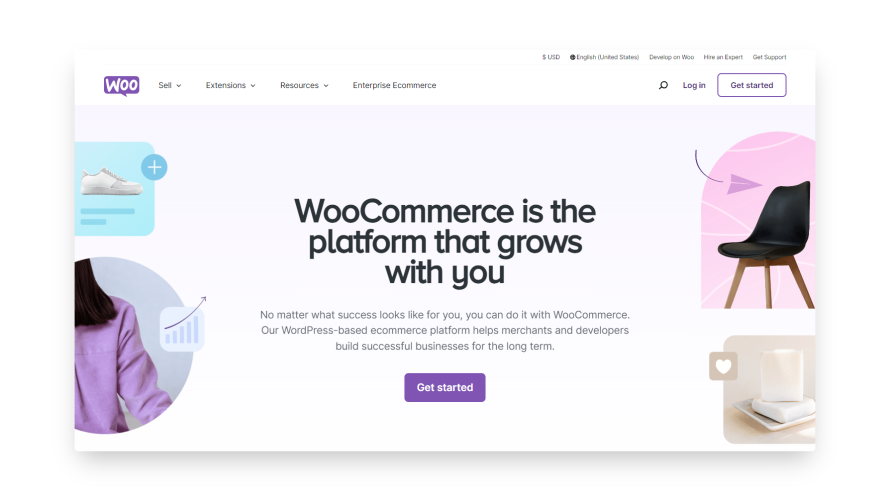
WooCommerce is a highly flexible and user-friendly e-commerce platform built on WordPress that is used by hundreds of online stores, such as Nutribullet. It's ideal for businesses of all sizes, from small startups to medium-sized enterprises, looking for a customizable solution that integrates with their existing WordPress site. Some of its best features are:
- Extensive range of plugins and themes for customization.
- Integration with the WordPress CMS.
- Support for multiple payment gateways and shipping options.
- Mobile-friendly design with a dedicated app for on-the-go management.
- Multi-language and multi-currency support.
- Built-in marketing and SEO tools.
WooCommerce's flexibility and WordPress integration make it a powerful choice for businesses aiming to establish a solid online presence while maintaining control over their e-commerce ecosystem.
Drupal Commerce
Image
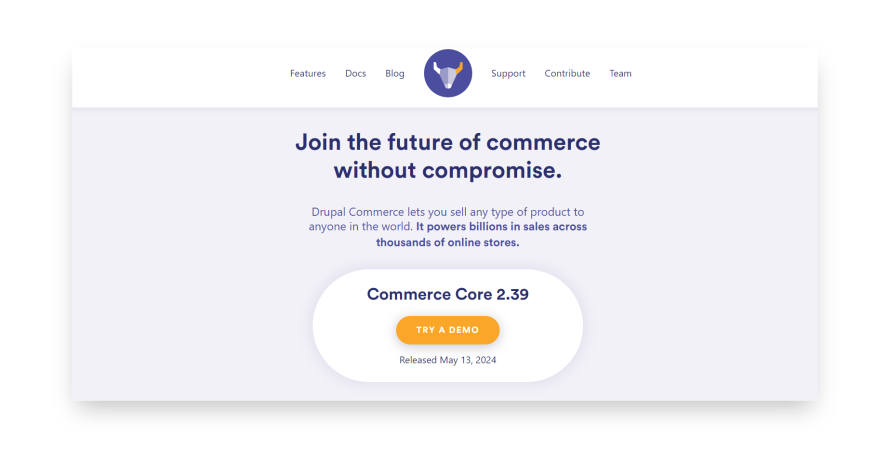
Drupal Commerce is a highly customizable and scalable e-commerce platform integrated with Drupal. It is used by some large e-commerce stores such as Lush cosmetics. It has been designed to handle complex e-commerce needs, offering excellent content management capabilities alongside powerful commerce features:
- Highly flexible and customizable architecture.
- Strong support for content-driven commerce.
- Sophisticated product data model with media library integration.
- Powerful search interfaces with faceted filtering.
- Custom fields, layouts and design patterns for enhanced merchandising.
- Extensive integration capabilities with third-party systems.
Drupal Commerce is best suited for businesses that need a sturdy CMS alongside their e-commerce platform.
Magento Open Source
Image
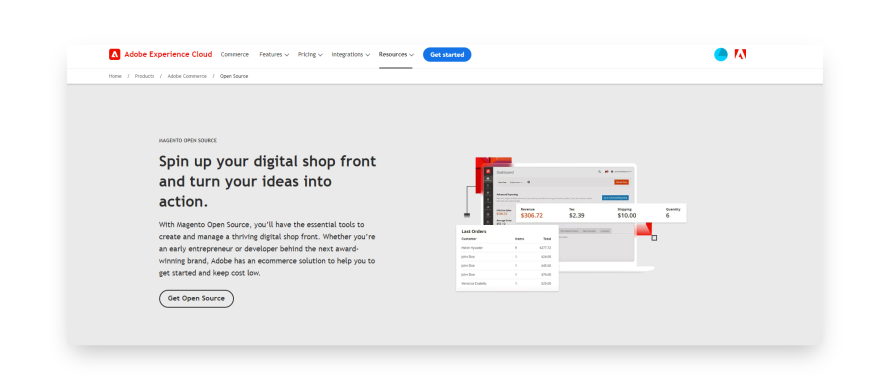
Magento Open Source is a powerful and scalable e-commerce platform even after Adobe's acquisition of Magento in 2018. While Adobe now offers Adobe Commerce, it has maintained Magento Open Source as an option for businesses of all sizes. While Magento is its own CMS, it can integrate with other systems like WordPress through extensions.
Magento Open Source is ideal for medium to large businesses that need a highly customizable and scalable e-commerce platform, particularly those with access to technical expertise or resources for development and maintenance.
OpenCart
Image
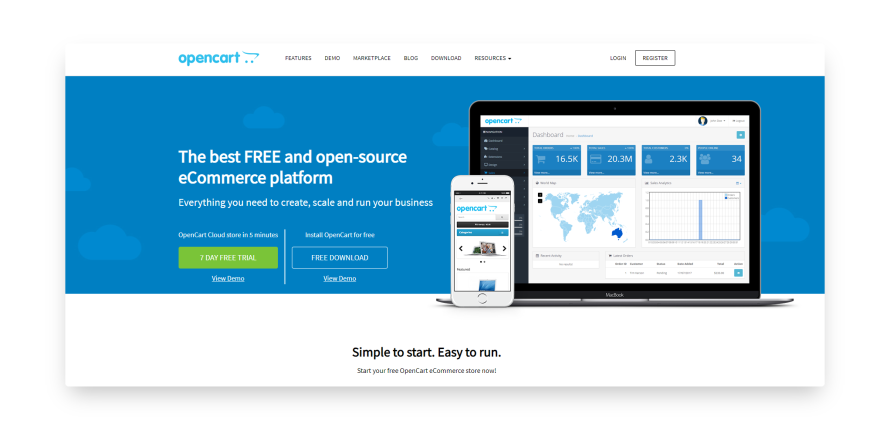
OpenCart is a user-friendly e-commerce platform with many extensions and themes, making it suitable for small to medium-sized businesses. Some great things to note here are:
The ideal user of this would be small to medium-sized businesses looking for an easy-to-manage e-commerce platform.
PrestaShop
Image
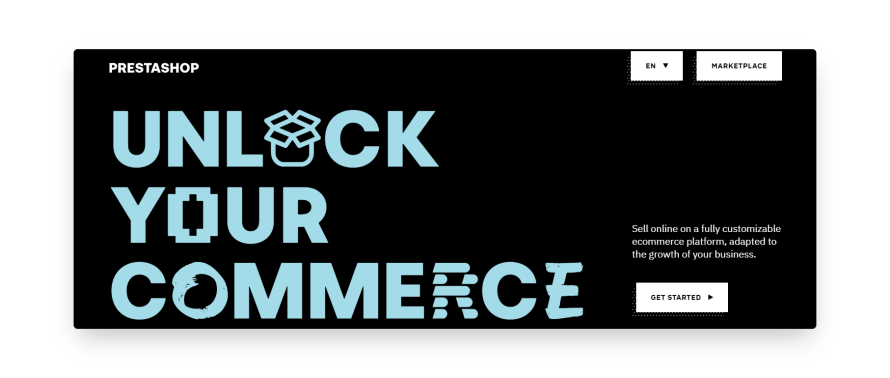
PrestaShop is a highly customizable e-commerce platform with features suitable for businesses of all sizes. It balances ease of use and flexibility, making it adaptable to various business needs.
This is ideal for businesses of all sizes looking for a flexible and customizable e-commerce platform!
Spree Commerce
Image
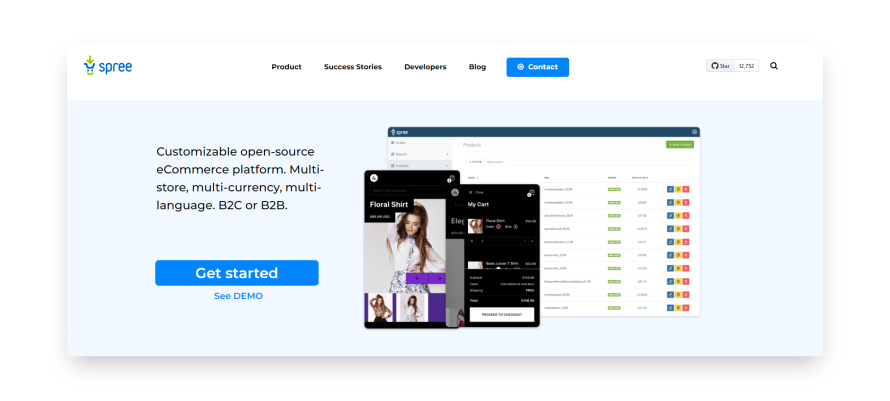
Spree Commerce is a highly flexible and developer-friendly platform ideal for businesses requiring extensive customization. It can integrate with various CMSs, including Ruby on Rails applications.
nopCommerce
Image
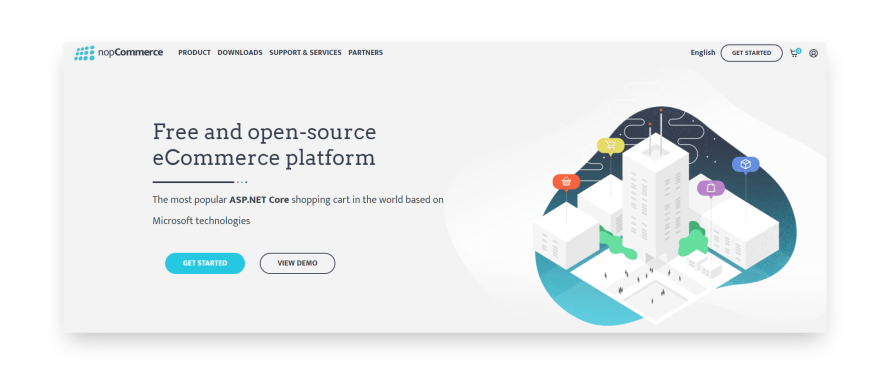
NopCommerce is a scalable e-commerce platform based on ASP.NET that is suitable for businesses of all sizes.
Shopware
Image

Shopware is a powerful e-commerce platform that offers a wide range of features to help businesses create and manage their online stores. From customizable templates and themes to advanced marketing tools and analytics, Shopware provides businesses with everything needed for an online store.
Saleor
Image
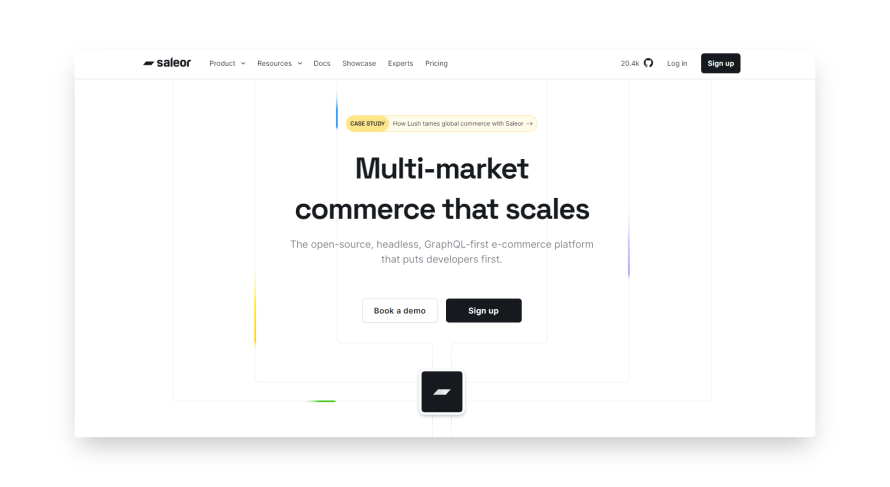
Saleor is a modern, highly customizable platform built on Python and Django, suitable for businesses requiring a scalable e-commerce solution. Saleor is headless, meaning it can integrate with any front end or CMS you choose.
Saleor would be suitable for businesses with access to technical expertise that requires a modern, scalable e-commerce platform.
Odoo
Image

Odoo is an integrated suite of business applications, including e-commerce, suitable for businesses looking for an all-in-one solution.
Odoo is excellent for businesses looking for an integrated suite of business applications, including e-commerce.
Taking Your Online Store to the Next Level With Pantheon
Pantheon is a leading WebOps platform renowned for its hosting and development tools for WordPress and Drupal websites. For e-commerce businesses, scalability, security and performance are essential – and we know it!
Pantheon’s cloud infrastructure is designed to support high traffic volumes, ensuring reliable uptime and fast load times even during peak periods. Managed scaling features allow the platform to handle traffic spikes, meaning your online store can manage sudden visitor surges without a hitch.
It's important for e-commerce businesses to prioritize security, especially when keeping customer data and transactions safe. Pantheon provides security features like advanced firewalls, regular security updates and proactive monitoring to protect your online store from potential threats!
Pantheon in Action: Kids Eat in Color
Image

Kids Eat in Color (KEiC), a team giving evidence-based guidance to families and healthcare providers, successfully transitioned to WooCommerce on WordPress with Pantheon. This move, undertaken with the help of Digital Polygon, was driven to accommodate the company’s growing audience of over 100,000 monthly page views!
John Doyle, CEO of Digital Polygon, noted that Pantheon's reliability was crucial for handling increased traffic. He said, “With more and more traffic coming to their website, it didn’t make sense to go to a shared hosting platform. We went with Pantheon to protect Kids Eat in Color’s online experience from outages. Having Pantheon’s tooling helped our team to be more efficient and focus on innovation instead of maintenance.”
The transition unified user experience, reducing customer service requests by 85%. Integration of LearnDash LMS improved access to product orders and courses, while SEO efforts increased organic reach and traffic by 71%.
Choosing the Right Platform for Your E-Commerce Business
When choosing an e-commerce platform, businesses must consider which one will best suit their needs. Open-source platforms offer numerous benefits, such as full control over your store, lower initial costs, extensive customization options, strong community backing, and the ability to scale with growth.
Pantheon enhances WordPress and Drupal sites by providing superior performance, excellent security and ultra-fast hosting. To see how Pantheon can improve your workflow and elevate your online store, watch the Pantheon Demo!